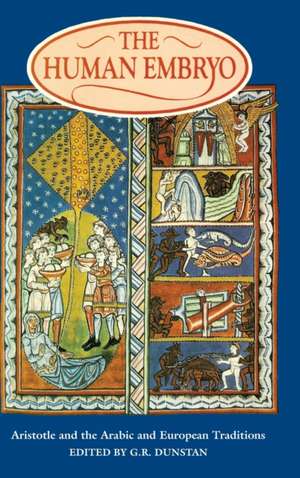Human Embryo: Aristotle and the Arabic and European Traditions
Editat de G.R. Dunstanen Limba Engleză Hardback – 14 feb 2019
Questions asked by Greek philosophy and science - how do we come to be? How do we grow? When are we recognizably human? - are addressed with new intensity today. Modern embryology has changed the methods of enquiry and given us new knowledge. Public interest and concern are high because medical applications of new knowledge offer benefits and yet awaken ancestral fears. The law and politics are called upon to secure the benefits without realizing the fears. Philosophers and theologians are involved once again.
In this volume, some of the world's authorities on the subject trace the tradition of enquiry over two and a half thousand years. The answers given in related cultures - Greek, Latin, Jewish, Arabian, Islamic, Christian - reflected the purposes to be served at different times, in medical practice, penitential discipline, canon law, common law, human feeling. But the terms in which the questions were discussed were those set down by the Greeks and transmitted through the Arabic authors to medieval Europe.
Preț: 656.69 lei
Preț vechi: 852.85 lei
-23% Nou
Puncte Express: 985
Preț estimativ în valută:
125.66€ • 130.94$ • 104.04£
125.66€ • 130.94$ • 104.04£
Carte tipărită la comandă
Livrare economică 03-17 aprilie
Preluare comenzi: 021 569.72.76
Specificații
ISBN-13: 9780859893404
ISBN-10: 0859893405
Pagini: 248
Ilustrații: illustrations
Dimensiuni: 236 x 155 x 20 mm
Greutate: 0.5 kg
Ediția:First edition
Editura: UNIVERSITY OF EXETER PRESS
Colecția University of Exeter Press
Locul publicării:United Kingdom
ISBN-10: 0859893405
Pagini: 248
Ilustrații: illustrations
Dimensiuni: 236 x 155 x 20 mm
Greutate: 0.5 kg
Ediția:First edition
Editura: UNIVERSITY OF EXETER PRESS
Colecția University of Exeter Press
Locul publicării:United Kingdom
Recenzii
“All the chapters are well researched and annotated...the text becomes much more gripping as the relationship of contemporary opinion to the views of preceding generations becomes apparent.” –British Medical Journal
“The book is thoroughly documented, carefully edited and beautifully produced ... care has also been taken to make the work readable and accessible to a non-specialist who wants to find out more about the thought of bygone ages concerning matters of 'contemporary concern'.” –Bioethics
“This book helps us with the history of the ethics that we must know if we are to deal with the technology of the future.” –Independent
